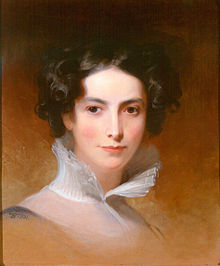May 3, 2021:

Urban legend or truth? Will we ever know?
Rebecca, daughter of the merchant Isaac of York, is the Jewish heroine of Walter Scott’s Ivanhoe (and, of course, of my Rebecca of Salerno). The fair Saxon noblewoman, Rowena, is the Christian heroine starring in the love triangle Scott created. Books such as Ivanhoe, published in the UK in 1820, routinely featured Christian heroines. A Jewish heroine was as rare as…rubies, to say the least. And a Jewish heroine who nearly toppled her rival in a love triangle with a devout Christian knight just returned from the Crusades… Is there any comparable character in the literature of the era?
One wonders where did the character of Rebecca come from? We may never have a definitive answer. Perhaps the most widely held origin theory is that she grew from conversations between Washington Irving and Walter Scott. Irving was very well-acquainted with Rebecca Gratz, a Jewish woman, a philanthropist, who befriended his fiancée, Matilda Hoffman. Gratz nursed Hoffman, who died at a young age of consumption. Irving so loved Hoffman that he needed to leave the US to deal with his broken heart.
According to legend, Irving extolled Gratz to Irving, touting her generosity, nobility, and great nursing skills. The legend goes on to identify Rebecca Gratz as the model for Ivanhoe’s Rebecca. However, according to Joseph Jacobs’s account for the American Jewish Historical Society, Scott might have created Rebecca solely from his imagination or might have had models from among contemporary German Jewish women or from an American Jew who married an Englishman and lived in Bath. Jacobs talks of a letter that was supposed to clinch the deal in favor of Rebecca of Gratz, who self-identified as Scott’s model, but no trace of this letter has ever been found.
Certainly Ivanhoe’s Rebecca matches Gratz in several ways: first name, nursing ability, belonging to a merchant family, being generous, and choosing faith over the love of a Christian man. None of the other potential models had as much congruence with Scott’s character. Will we ever know the definitive truth? As so much else in the past, Rebecca’s origins remain a mystery. What is known is that Gratz read and enjoyed Ivanhoe. When asked if she was the model for this highly idealized Jewish woman, Gratz coyly demurred.
At the end of the book, we see Rebecca and her dad heading south from Britain to a more congenial place for Jews. Her role in Ivanhoe might have been over, but, for several decades, I couldn’t help wondering, what would come next for Rebecca? I eventually realized that the only way to find out was to write the rest of her biography. That is the origin of my book Rebecca of Salerno: A Novel of Rogue Crusaders, a Jewish Female Physician, and a Murder.